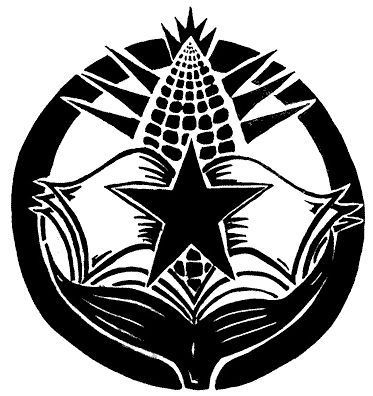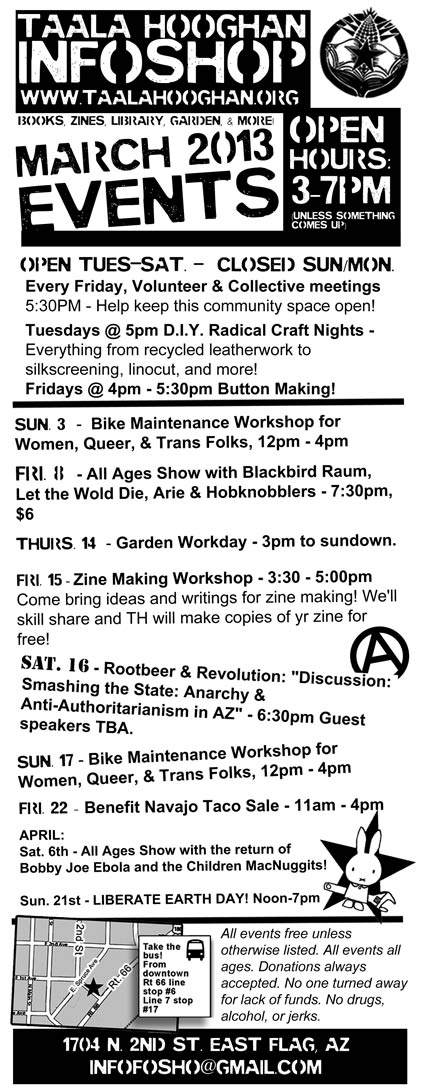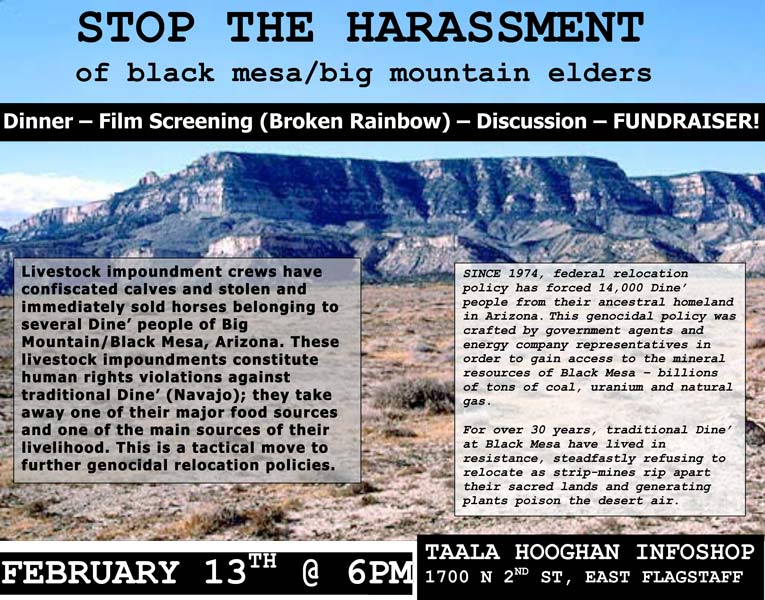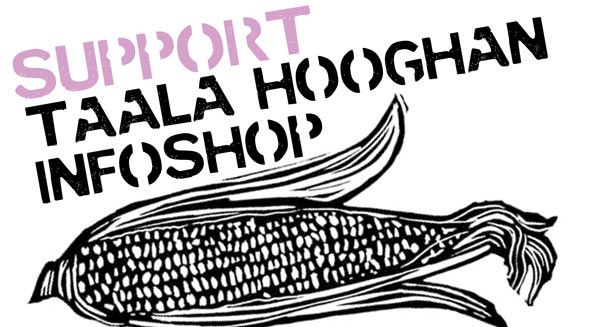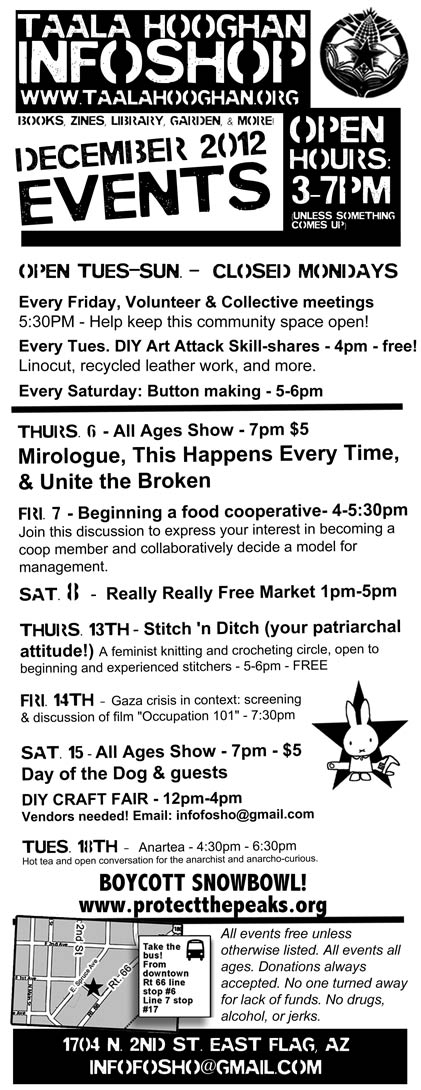“For what it is worth we will have to establish a way to live that is both indigenous, which is to say of the land that we are actually on, and anarchist, which is to say without authoritarian constraint.†– Aragorn!
“My ancestors wanted autonomy and I want that too.†– JD
“We have lived here long before the US government, and we will continue to live here long after it is gone.†– Diné relocation resister.
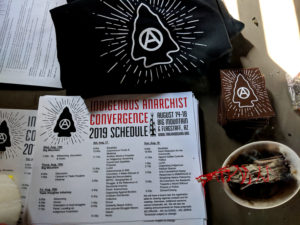 Kinlani/Flagstaff, AZ — More than 120 participants and over 30 groups and organizations converged at Táala Hooghan Infoshop to discuss, debate, and share their perspectives on Indigenous Anarchism.
Kinlani/Flagstaff, AZ — More than 120 participants and over 30 groups and organizations converged at Táala Hooghan Infoshop to discuss, debate, and share their perspectives on Indigenous Anarchism.
The initial call-out for the convergence stated, “…we call for those also seeking a fulfilling life free from domination, coercion, & exploitation to gather around this fire. For those sickened by fascinations with dead white-men’s thoughts (and their academies and their laws), reformist & reactionary “decolonial activismsâ€, and the uninspired merry-go-round of leftist politics as a whole. For all those ungovernable forces of Nature…â€
Though leftist reactions were often replicated and much time was spent with well rehearsed presentations, the primary goals of coming together and interrogating the propositions of Indigenous Anarchism were fulfilled. We were also able to coordinate this gathering with a budget of less than $800 (thanks to everyone online who donated!) as we relied heavily on the mutual aid from many of our relatives in Kinlani who cooked, donated food, opened up their homes, and volunteered to support. In those terms the convergence could be counted as a success, but what we share in this report back should not be viewed as a celebration. This is no way represents everything that was discussed, challenged, debated, or expressed. Perhaps this incomplete offering written from memory, limited recordings, and scrapped together notes, should be seen more as fragments of stones with which we can sharpen ourselves on.
When we put the save the date out for the Indigenous Anarchist Convergence (IAC) we had a focus set on a regional dialogue that would be shaped primarily by those who were fairly familiar with the ideas we’ve been working on, we did not anticipate the overwhelming response from people throughout the so-called US. We also specifically invited those few voices who we’ve read or directly talked with in great length about Indigenous Anarchism (some who couldn’t make it), and with that we knew we were inviting controversial people and that the potential for pushback was serious. The schedule was planned as one track and packed with discussions and workshops. Though each session was given substantial time (some over two hours), we shifted, waited, and went overtime as these functions inevitably do.
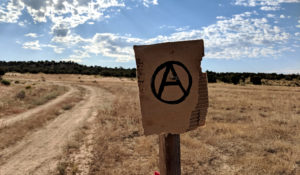 A preliminary gathering was held at Big Mountain hosted by Louise Benally and her family who have been resisting forced relocation by remaining on their ancestral homelands. This area has been declared the Sovereign Diné Nation by the residents who assert their autonomy free from US and tribal government control. Though only a few participants from the convergence attended, the connections and discussions (primarily in Diné bizaad), addressed land-based struggles, climate change, coal mining, traditional medicines, and autonomy.
A preliminary gathering was held at Big Mountain hosted by Louise Benally and her family who have been resisting forced relocation by remaining on their ancestral homelands. This area has been declared the Sovereign Diné Nation by the residents who assert their autonomy free from US and tribal government control. Though only a few participants from the convergence attended, the connections and discussions (primarily in Diné bizaad), addressed land-based struggles, climate change, coal mining, traditional medicines, and autonomy.
The gathering also became a celebration of the shutdown of Navajo Generating Station, a coal fired 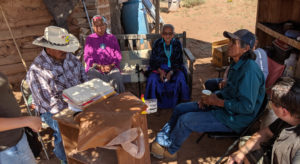 power plant operating in the region, which ran its last train of coal just the day before. Diné elder matriarchs Rena Babbit Lane & Ruth Baikedy joined the next day as John Benally shared an herb walk then addressed the geo-politics of the so-called Navajo-Hopi Land dispute. Overall the preliminary gathering, which was held at a traditional hogan with no running water or electricity, demonstrated the strength and resolve of traditional ways of life that are the backbone of the autonomous resistance at Big Mountain.
power plant operating in the region, which ran its last train of coal just the day before. Diné elder matriarchs Rena Babbit Lane & Ruth Baikedy joined the next day as John Benally shared an herb walk then addressed the geo-politics of the so-called Navajo-Hopi Land dispute. Overall the preliminary gathering, which was held at a traditional hogan with no running water or electricity, demonstrated the strength and resolve of traditional ways of life that are the backbone of the autonomous resistance at Big Mountain.
On Friday evening at Táala Hooghan infoshop, the convergence started with a prayer by traditional practitioner Jones Benally that connected the gathering to the sacred mountains within which we were welcoming everyone.
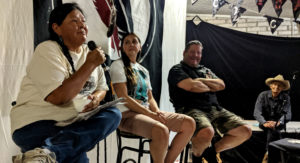 A statement was made that “this gathering is going to be messy, mistakes will be made, yet we are excited with that and what possibilities may come from this. Though this convergence may be premature and we may not have the entire capacity to host, we did not want to wait for this to happen, we wanted to push the conversations forward so that we can intervene in the current shitty political realities we face in more direct and effective ways. We also do not want you to participate expecting this convergence to be an annual affair, as we would then face the trap of Indigenous anarchism being defined by our context and our terms, we know this gathering would look very different if it were to be held in your lands and that you would do some things very differently than us. We would offer that the next convergence be hosted elsewhere so please think about while being here.†A statement was also issued the infoshop could not guarantee it was a safe space, but that it should be viewed as a threatening space to all forms of oppressive behaviors and that known abusers, particularly perpetrators of sexual and gender-based violence, would be kicked out of the gathering.
A statement was made that “this gathering is going to be messy, mistakes will be made, yet we are excited with that and what possibilities may come from this. Though this convergence may be premature and we may not have the entire capacity to host, we did not want to wait for this to happen, we wanted to push the conversations forward so that we can intervene in the current shitty political realities we face in more direct and effective ways. We also do not want you to participate expecting this convergence to be an annual affair, as we would then face the trap of Indigenous anarchism being defined by our context and our terms, we know this gathering would look very different if it were to be held in your lands and that you would do some things very differently than us. We would offer that the next convergence be hosted elsewhere so please think about while being here.†A statement was also issued the infoshop could not guarantee it was a safe space, but that it should be viewed as a threatening space to all forms of oppressive behaviors and that known abusers, particularly perpetrators of sexual and gender-based violence, would be kicked out of the gathering.
On the Indigenous front there were several distinct tensions addressed.
Discussions on “good vs bad traditionalism†including a challenge to “not romanticize a pre-contact utopia†with a primary focus on gender were prevalent throughout the weekend.
On the panel “Locating an Indigenous Anarchism, Chris Finley stated, “I want to make sure that Indigenous queer people, two spirit people are sacred people. Queerness is not a result of colonization, that idea is fucked up. I want to make sure that we are sacred parts of our community. One of the things that we can do, while the settlers get their shit together, is work on homophobia in our communities, because that is a huge part of how the settler state maintains power, and these are things that we can work on now.â€
Brandon Benallie, of Ké’ Infoshop stated, “Traditionalism is not the same as our life ways. 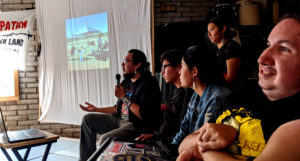 Traditionalism is like a museum piece that sits on a shelf and gets old, whereas our life ways are accumulating knowledge and always growing, it’s the people getting old who don’t want to grow.â€
Traditionalism is like a museum piece that sits on a shelf and gets old, whereas our life ways are accumulating knowledge and always growing, it’s the people getting old who don’t want to grow.â€
Another question was “how do we address movement policing elders or the elders who tell us go back to camp?†This primarily related to experiences in Standing Rock where elders held people back at the frontlines. Anecdotes were shared that provided no clear tactic other than recognizing that there are “elders and those who get older,†and it’s our challenge to understand how to address that dynamic based upon the situations in our communities. Julie Richards aka MAMA Julz, a water protector from the Mothers Against Meth Alliance, stated, “I want to be one of those elders who still locks down on the front lines to save our lands and future generations.â€
Identity politics was also prevalent, including an assertion of the lack of centering of trans & afro-Indigenous voices. Issues of identify policing were challenged specifically with so-called “white passing†Indigenous Peoples. This brought up questions of settler colonial attempts at “paper genocide.†An afro-Indigenous trans person voiced that their struggle was one in which they are, “hated by society and the people you fight for.†Multiple calls were made to ensure that organizing spaces center trans and afro-Indigenous voices. Calls were also made to confront anti-blackness in Indigenous organizing (such as cooptation of Black Lives Matter by Native Lives Matter) and to ensure inclusivity in the movement to stop Missing and Murdered Indigenous Women (#mmiw) by adding #mmiwgts to include trans and two spirit relatives who face further disproportionate hetero-patriarchal violence.
Land and place were central to nearly all conversations though some points were made that, “If Indigenous means of the earth, who is not an Indigenous anarchist?†and a concern that use of the term “turtle island†was too limiting or exclusive of a term. These tensions led some participating Diné and other Indigenous Peoples to clarify that their anarchism is a specific tendency due to their distinct cultural contexts.
The term “decolonization†seemed to have a heavier weight in the midst of these discussions as it was used very sparingly. Though in some ways the “decolonial†dynamics played out much as they do in other circles. The term “decolonization†is used in both radical and liberal spaces as an empty rhetorical buzzword, this is quite often seen in performative “land acknowledgements†when it should be meaningfully used with and in respect to the Indigenous Peoples’ whose lands we are on. That dynamic was most clear from those who came to the convergence from large cities. In some ways their contexts felt distant and alienating, which is a dynamic we usually brace ourselves to face from academics, so it was concerning though not surprising in relation to the space and ways in which our cultural protocols were ignored and in some ways disrespected.
JD from so-called Canada spoke to the current “reconciliatory†efforts by the state to address genocide of Indigenous Peoples and addressed how “there can be no reconciliation that recognizes the self-determination of Indigenous peoples so long as the state of Canada exists… My ancestors wanted autonomy and I want that too.â€
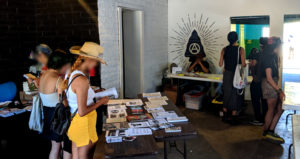 On the anarchist front there surprisingly seemed to be less disagreement. Much of the emphasis was put on an Indigenous anarchism as a unique radical anti-colonial tendency antagonistic towards the european orientation of the term. Observations were shared regarding how the concepts of mutual aid, non-hierarchal social relations, and direct action were already embedded in many, though not all, of our distinct Indigenous knowledge systems, and that state-based revolutionary strategies, like socialism and communism, are inherently anti-Indigenous. Though there was not a cohesive agreement, a tendency expressed was that anarchism is a tool or position with which we can use to distinguish ourselves and efforts from liberal and leftist-produced settler colonial politics (primarily reformism and Marxism and its “tangentsâ€). Little time was wasted reacting to white anarchist identity, which was perhaps the primary reason the Anarchist People of Color (APOC) position welcoming Indigenous, Black, and Brown People was invoked.
On the anarchist front there surprisingly seemed to be less disagreement. Much of the emphasis was put on an Indigenous anarchism as a unique radical anti-colonial tendency antagonistic towards the european orientation of the term. Observations were shared regarding how the concepts of mutual aid, non-hierarchal social relations, and direct action were already embedded in many, though not all, of our distinct Indigenous knowledge systems, and that state-based revolutionary strategies, like socialism and communism, are inherently anti-Indigenous. Though there was not a cohesive agreement, a tendency expressed was that anarchism is a tool or position with which we can use to distinguish ourselves and efforts from liberal and leftist-produced settler colonial politics (primarily reformism and Marxism and its “tangentsâ€). Little time was wasted reacting to white anarchist identity, which was perhaps the primary reason the Anarchist People of Color (APOC) position welcoming Indigenous, Black, and Brown People was invoked.
Chris Finley shared their experiences coming to anarchism through the punk-rock scene and arriving at a place of Indigenous feminist anarchism, “…I came back to anarchy because I want to know not just what I am against, because I knew this shit was fucked up, but what I wanted to be for and who I wanted to be with in that for. That’s a difficult question, I am colonized, it’s really hard for us to think of something outside of this so we need other people and to help us through that and to imagine those things together.â€
A zine titled, “Autonomously and with Conviction: A Métis Refusal of State-Led Reconciliation†that was distributed at the event asserted, “Anarchism is a political philosophy – some might say a beautiful idea – that believes in self-governed societies based on voluntary association with one another. It advocates for non-hierarchical decision-making, direct participation in those decisions by affected communities, and autonomy for all living persons. Furthermore, it leaves space for the valuation of non-human entities beyond their monetary worth or usefulness to human beings. My Indigenous teachings have communicated to me that our communities are important, but so are we as individuals. Traditional ways saw decision making as a participatory process, based on consensus, where communities made choices together. My teachings tell me that the land can offer us what we need, but never to take more than that. I see these ideas as fundamentally compatible. I’d like to see an anarchy of my people and the anarchy of settlers (also my people) enacted here together, side by side. With an equal distribution of power, each pursuing healthy relationships, acting from their own ideas and history. Just as the Two Row imagined. I would like to see the centralized state of Canada dismantled. I’d like to see communities take up the responsibility of organizing themselves in the absence of said central authority.â€
Louise Benally spoke to her experiences resisting forced relocation on Big Mountain and calling for further action to take down all these systems that are destroying Mother Earth. Louise stated that anarchism is “about action, you believe in yourself, you believe in what you’re going to speak about, you believe in what you’re doing, you’re not bound by a group or governmental entity, you do what you have to do. I believe in the earth and the spirits that work within the earth, that is where I first go. Working with and through nature, that is the only thing that I have faith in, I don’t trust any system because it has never done anything for me. I don’t practice christianity, that is not something that I understand. I don’t base my ways on that, I don’t believe in the US government because that is just about destruction of a culture and consumption of culture.â€
The panel “Locating an Indigenous Anarchism†was named after Aragorn!’s zine’ that was published in 2005, from which he read a section of and provided a definition of Indigenous anarchism, “For what it is worth we will have to establish a way to live that is both indigenous, which is to say of the land that we are actually on, and anarchist, which is to say without authoritarian constraint.†Aragorn! stated, “On the one hand I have a very big problem with hyphenated anarchism, when people refer to themselves as anarchist and blank, they really mean the blank and the anarchism is a secondary concern. I’ve always seen seen anarchism and indigeneity as being synonymous terms. For me the idea of an anarchism that isn’t placed right here, never made sense. The idea of anarchism as a set of western enlightenment values that somehow we learned in school or something never made sense to me. One of the concerns I have about this weekend, is that sometimes our enthusiasm is more our concern and more the way that we communicate ourselves and our ideas than anything else, and in the case of something as important as this idea, this idea of a land based politics that is huge in size, I don’t want this to turn into politics as usual. I say that knowing that that’s going to be a challenge when it comes up in details.â€
After reading the except from “Locating an Indigenous Anarchism†Aragorn! emphasized, “For me those are the only terms that matter, ‘authoritarian constraint’ and ‘place.’â€
The Against Settler Colonial Politics panel on Sunday further asserted that, “anarchism is in fact something we can define ourselves,†The panel also referenced Russell Mean’s statement “For America To Live Europe Must Die†as an eloquent Indigenous response to the proposition of Marxist authoritarianism. A zine titled, “Marxism and it’s Tangents… for anarchists,†was distributed that stated, “…because sometimes people are not really on our team.†Some of the Q&A had push-back 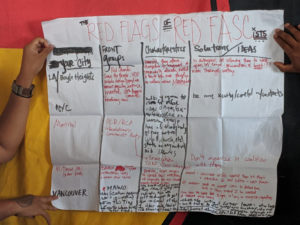 regarding a “need for leftist unity†and not to perpetuate “european-based leftist disputes,†to that responses were made that we “should be honest about leftist politics, that the conclusions of communism and socialism are anti-Indigenous.†A panelist asked the question, “are we criticizing authoritarianism or european dogma?†A sheet titled, “the Red Flags of Red Fasc(ists)†listing authoritarian leftist front groups was shared by a persxn who was at La Conxa in so-called LA when it was attacked by a Maoist group.
regarding a “need for leftist unity†and not to perpetuate “european-based leftist disputes,†to that responses were made that we “should be honest about leftist politics, that the conclusions of communism and socialism are anti-Indigenous.†A panelist asked the question, “are we criticizing authoritarianism or european dogma?†A sheet titled, “the Red Flags of Red Fasc(ists)†listing authoritarian leftist front groups was shared by a persxn who was at La Conxa in so-called LA when it was attacked by a Maoist group.
On the organizing/activism/struggle front, there were many workshops proposed about border struggles which were the primary focus of action against attacks on Indigenous lands and Peoples for the convergence. The O’odham Anti-Border Collective shared their strategies to maintain their ways of life despite ongoing occupation, borders, and barriers on their traditional homelands. On the Autonomous Organizing Against Borders panel, an organizer from so-called El Paso addressed how their community is responding to white supremacist attacks while they’re facing extreme state repression. They also shared how a radical community center was undermined by “the subtle forms of white supremacy that invade and co-opt our spaces.†They railed against “non-profit liberal power wielding mechanisms,†and asserted that, “we’re not here to ask for reform. The law is killing our people.â€
Another organizer from occupied Tongva lands so-called Los Angeles discussed their work directly supporting migrant folx held in concentration camps. The organizer received a call from a trans migrant person being held in one of the concentration camps and put them on the microphone. The conversation was emotional and raw with the tension of these struggles filling every corner of the room.
On the “Solidarity Means Action, Anti-colonial-Struggle Means Attack!†panel MAMA Julz stated that, “Prayer and action go hand in hand, I’ve always stood on that. If we’re sitting there in prayers and there’s no-one out there then nothing is going to get done. Our ancestors want us to meet them half-way. No matter how scary it gets, remember that as long as we’re fighting for the people and mother earth in a good way, we’re always going to be protected. If you believe you can shut shit down, shut shit down, but pray first.â€
Leona Morgan from Diné No Nukes and Haul No! spoke about fighting nuclear colonialism which has left thousands of abandoned uranium mines and spread cancer throughout Indigenous Lands. She stated that “70% of uranium comes from Indigenous lands†and that current proposals call for bringing all the nuclear waste from throughout the “US†into New Mexico effectively creating a “national sacrifice zone. They’re saying here is that nuclear power is a ‘clean’ solution to global warming while we are the ones getting cancer, were the ones that have our water, plants, and food sources contaminated.†She looked towards international anti-nuke direct action movements that are stopping uranium shipments and called for support, “We may need to do that here.â€
Klee Benally from Protect the Peaks and an organizer of the convergence provided an overview of the struggle and failures to stop the desecration of the holy San Francisco Peaks, which is located just outside of Kinlani/Flagstaff. A ski resort has been allowed by the Forest Service to make fake snow out of millions of gallons of treated sewage on the mountain. Klee stated, “Settler colonial laws were never designed to benefit Indigenous peoples’ ways of life, they were designed to destroy them. To be more effective we need to be honest with ourselves and understand how Standing Rock was strategic failure in that it didn’t stop the pipeline, of course it was a social and cultural success, but we need to be critical in real-time about these struggles so we can be more effective. If we don’t talk about our failures how can we learn?â€
On Sunday evening, before everyone started sharing their contact info, before dinner and after a lecture, we stopped and decided not to end in accordance with our traditional protocol.
An organizer for the convergence wrote in another report back, “Somewhere at the gathering, I expected to be in the presence of indigenous anarchism. I did not know if indigenous anarchism was the fire we would gather around, if it was the individuals converging, or if it was an empty space where individuals were to ignite the flames. It’s safe to say, my expectations were met. I witnessed an indigenous anarchism but it was unfamiliar to me, a Diné anarchist…. The potential I have discovered at the convergence is the particulars of Diné anarchy. Fires made from crystal and fires made from turquoise. Fires bright enough to find the light of other Diné anarchists in this dark world I find myself in. A world sickened from the industrialization of civilized humans whose culture of control and destruction forces all living things to adopt, adapt, or die. I suggest that Diné anarchy offers the addition of a choice to attack. An assault on our enemy that weakens their grip on, not only our glittering world, but the worlds of others. An opportunity for the anarchy of Ndee, of O’odham, and so on, to exact revenge on their colonizers. Until all that’s left for Diné anarchists is to dissuade the endorsements of the next idol expecting our obedience.â€
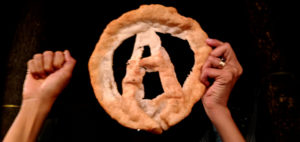
For the moment we see Indigenous Anarchism as a reference point, but this term is so broad that for all it could encompass it also stifles. We’re not interested in re-engineering social arrangements, we’re interested in inspired formations, agitations, interventions, and acts towards total liberation. From our perspective, at the base of Do’koo’osliid, we see more use in building contextual understandings deeply rooted in our sacred lands and teachings. This places us in some ways at odds with a flattening that the larger emergent force of Indigenous Anarchism would have. As Aragorn! stated, “Indigenous anarchism is a politics that has yet to be written and maybe that is a good thing.â€
For now we will continue to agitate, organize, write, discuss, and provoke to further radical autonomous/anti-authoritarian Indigenous tendencies towards total liberation.
###
